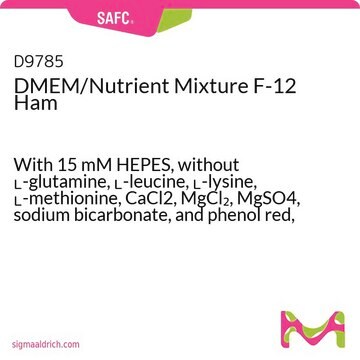D5648
DMEM - high glucose
With ʟ-glutamine, without sodium bicarbonate and sodium pyruvate, powder, suitable for cell culture
Synonym(s):
DME, Dulbecco′s Modified Eagle′s Medium - high glucose, DMEM
About This Item
Recommended Products
product name
Dulbecco′s Modified Eagle′s Medium - high glucose, With 4500 mg/L glucose and L-glutamine, without sodium bicarbonate, powder, suitable for cell culture
form
powder
technique(s)
cell culture | mammalian: suitable
components
phenol red: yes
L-glutamine: yes
NaHCO3: no
HEPES: no
glucose: high
sodium pyruvate: no
shipped in
ambient
storage temp.
2-8°C
Looking for similar products? Visit Product Comparison Guide
Application
Quantity
Reconstitution
also commonly purchased with this product
Storage Class Code
11 - Combustible Solids
WGK
WGK 1
Flash Point(F)
Not applicable
Flash Point(C)
Not applicable
Certificates of Analysis (COA)
Search for Certificates of Analysis (COA) by entering the products Lot/Batch Number. Lot and Batch Numbers can be found on a product’s label following the words ‘Lot’ or ‘Batch’.
Already Own This Product?
Find documentation for the products that you have recently purchased in the Document Library.
Customers Also Viewed
Articles
Cell culture protocol for passaging and splitting suspension cell lines
Protocols
Powdered media and salt mixtures are extremely hygroscopic and should be protected from atmospheric moisture.
Our team of scientists has experience in all areas of research including Life Science, Material Science, Chemical Synthesis, Chromatography, Analytical and many others.
Contact Technical Service




